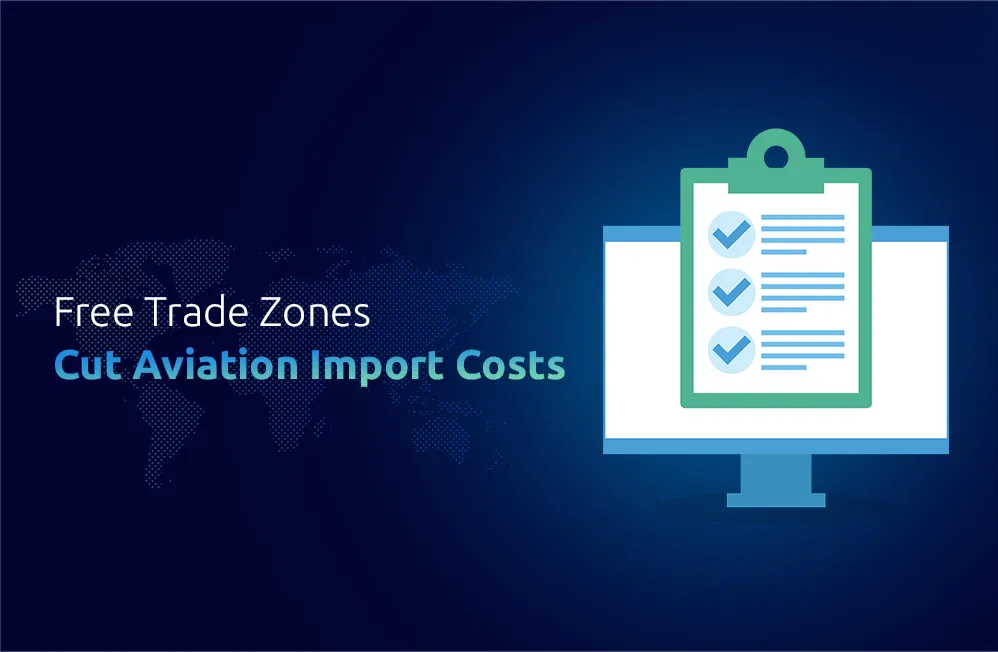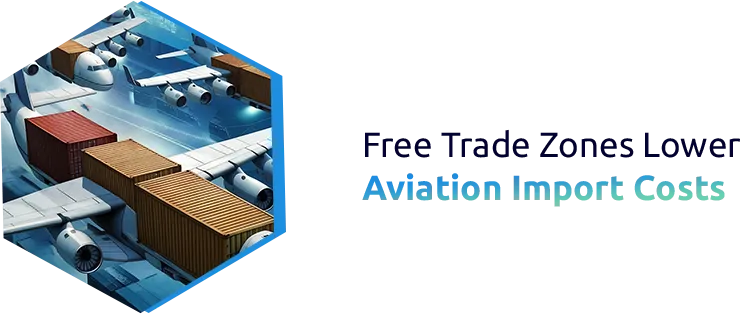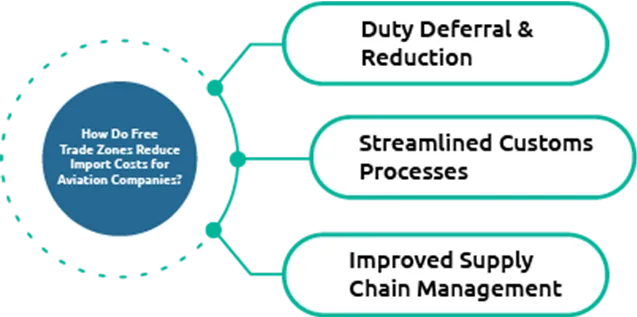Insight
Companies operating within the aviation sector face various difficulties in global trade, including managing increasing import expenses and customs process complexity. Implementing Free Trade Zones (FTZs) creates an effective solution that decreases such costs. Business operations within FTZs obtain a strategic framework that helps them reduce import taxes while expediting supply chains and meeting international trade requirements. Jet operators that use Free Trade Zones obtain significant financial benefits, enhanced operational effectiveness, and improved position in the global market.
What Are Free Trade Zones (FTZs)?
A Free Trade Zone is a specific area of the country that enables unhindered customs-free management of imported and manufactured goods. The target areas established as FTZs encourage international commerce and investments through reduced customs expenses, simplified trade processes, and adapted logistical systems. FTZs allow aviation companies to create a business advantage through reduced expenses alongside streamlined supply chain procedures.
How Do Free Trade Zones Reduce Import Costs for Aviation Companies?
Duty Deferral & Reduction
Most production activities pay significant fees or taxes when using customs hubs or FTZs. For importers, FTZ (Foreign Trade zones) may defer paying duty on imports until they pass through the domestic market or re-export. It can benefit cash flow and drive down import costs even further through trade agreements holding where they are in the FTZ.
Streamlined Customs Processes
FTZs facilitate customs clearance by providing pre-approved zones where goods can be processed quickly without extensive documentation or long wait times, expediting parts and equipment clearance time and shortening market delivery for aviation products. Customs officers are stationed within FTZs to monitor clearance activities while facilitating smooth imports.
Improved Supply Chain Management
The application of FTZs enhances aviation company warehouse operations. The supply chain becomes more efficient because FTZs enable the storage of goods before their required use, reducing unnecessary storage expenses. Through economies of scale, companies reduce shipment costs by consolidating their deliveries, reducing the expense and time required for numerous smaller packages.
Warehouse Logistics and Inventory Management
Within FTZs, companies can store inventory with deferred customs duties until the goods undergo transfer for utilization. The unlimited storage benefit finds particular value in the aviation industry due to the need to import expensive equipment and components regularly. FTZs enable businesses to store goods indefinitely without being charged for extra storage expenses for upcoming demand duration.
Foreign Trade Investment Incentives
The operating businesses in FTZs receive government financial support through benefits, including tax exemptions, reduced customs duties, and development funds for international trade programs. FTZ operations become more appealing to aviation companies because of the incentives that lower their business expenses connected to aviation goods processing.
Compliance and Risk Reduction in FTZs
The regulations of aviation companies can be safely managed by choosing to operate in a free trade zone. FTZs follow foreign trade policies to simplify customs clearance processes; thus, companies stay compliant without experiencing procedural delays. Using free trade zones helps aviation companies avoid fines, penalties, and shipment delays. FTZs enable aviation firms to benefit from the Generalized System of Preferences (GSP) because this system provides preferential tariff treatment based on products’ origin countries. FTZs provide additional savings to aviation operations by reducing purchasing expenses for necessary imported aviation components.
The Role of FTZs in Global Trade and Tariff Uncertainty
FTZ facilities protect aviation businesses from trade tariff uncertainties in the global marketplace. An FTZ location provides companies with an operational buffer that minimizes the effects when tariffs rise unexpectedly. The FTZ enables companies to keep goods in storage to avoid unnecessarily high tariff expenses when changing market tariffs.
Conclusion
Free Trade Zones act as essential resources for aviation companies who want to cut import expenses while upholding compliance regulations for international trade. FTZs enhance aviation businesses by implementing reduced import duties while simplifying customs procedures and extending supply chain adaptability, which reduces operational costs. The increasing complexity of global trade makes FTZs important tools that assist companies in maintaining pricing competitiveness, reducing their tariff exposure, and improving logistics operations. One Union Solutions specializes in leading businesses through FTZ utilization and international trade advantages implementation practices to achieve efficient and cost-efficient operations.
Did you know,
According to recent market research, over 3,000 FTZs are operational worldwide, offering various benefits to companies involved in global trade.
FAQs
- What types of goods can be stored in Free Trade Zones?
Ans: FTZs can hold numerous parts (aviation parts, machinery, electronics, and components used in production). Customs duties are not imposed on goods until they are cleared from FTZ and entering the domestic market.
- What mechanisms do Free Trade Zones have to help businesses lower their tariff obligations?
Ans: The Free Trade Zone system enables aviation companies to lower tariff expenses on imported inputs, which they can use for exports or industrial manufacturing without immediately selling them in local markets.
- Do Free Trade Zones provide better control over supply chain management?
Ans: FTZs decrease inventory storage costs and extend storage length while making supply chains more flexible, thus simplifying warehousing and stock management operations. The logistics management process becomes more efficient for aviation companies through proper segment planning and response to changing market requirements.
- How do Foreign Trade Zones provide compliance advantages to users?
Ans: FTZs assist businesses in meeting international trade standards thanks to simplified customs handling procedures, which simplify cross-border trade operations. FTZs reduce the potential consequences of non-compliance penalties along with shipment delays.
- What motivation does an enterprise gain when conducting business inside an FTZ?
Ans: Several governments encourage businesses in FTZs through tax benefits, reduced tariff rates, and payment grants. The incentives increase business interest in establishing operations at these zones by lowering their import expenses.











